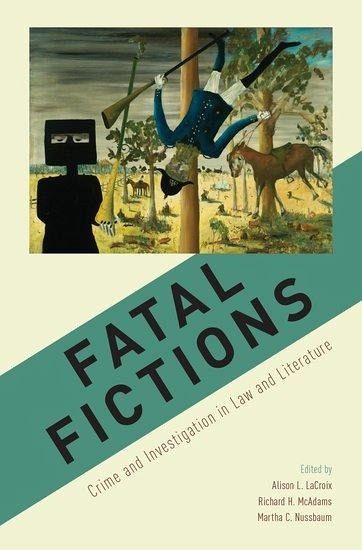
Fatal Fictions
Crime and Investigation in Law and Literature
Herausgeber: Lacroix, Alison L.; Nussbaum, Martha C.; Mcadams, Richard H.

PAYBACK Punkte
53 °P sammeln!
Writers of fiction have always confronted topics of crime and punishment. This age-old fascination with crime on the part of both authors and readers is not surprising, given that criminal justice touches on so many political and psychological themes essential to literature, and comes equipped with a trial process that contains its own dramatic structure. This volume explores this profound and enduring literary engagement with crime, investigation, and criminal justice. The collected essays explore three themes that connect the world of law with that of fiction. First, defining and punishing c...
Writers of fiction have always confronted topics of crime and punishment. This age-old fascination with crime on the part of both authors and readers is not surprising, given that criminal justice touches on so many political and psychological themes essential to literature, and comes equipped with a trial process that contains its own dramatic structure. This volume explores this profound and enduring literary engagement with crime, investigation, and criminal justice. The collected essays explore three themes that connect the world of law with that of fiction. First, defining and punishing crime is one of the fundamental purposes of government, along with the protection of victims by the prevention of crime. And yet criminal punishment remains one of the most abused and terrifying forms of political power. Second, crime is intensely psychological and therefore an important subject by which a writer can develop and explore character. A third connection between criminal justice and fiction involves the inherently dramatic nature of the legal system itself, particularly the trial. Moreover, the ongoing public conversation about crime and punishment suggests that the time is ripe for collaboration between law and literature in this troubled domain. The essays in this collection span a wide array of genres, including tragic drama, science fiction, lyric poetry, autobiography, and mystery novels. The works discussed include works as old as fifth-century BCE Greek tragedy and as recent as contemporary novels, memoirs, and mystery novels. The cumulative result is arresting: there are "killer wives" and crimes against trees; a government bureaucrat who sends political adversaries to their death for treason before falling to the same fate himself; a convicted murderer who doesn't die when hanged; a psychopathogical collector whose quite sane kidnapping victim nevertheless also collects; Justice Thomas' reading and misreading of Bigger Thomas; a man who forgives his son's murderer and one who cannot forgive his wife's non-existent adultery; fictional detectives who draw on historical analysis to solve murders. These essays begin a conversation, and they illustrate the great depth and power of crime in literature.













